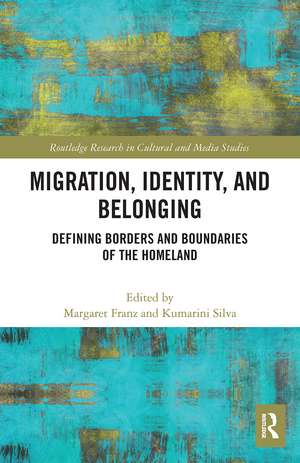Migration, Identity, and Belonging: Defining Borders and Boundaries of the Homeland: Routledge Research in Cultural and Media Studies
Editat de Margaret Franz, Kumarini Silvaen Limba Engleză Paperback – 29 aug 2022
| Toate formatele și edițiile | Preț | Express |
|---|---|---|
| Paperback (1) | 250.01 lei 6-8 săpt. | |
| Taylor & Francis – 29 aug 2022 | 250.01 lei 6-8 săpt. | |
| Hardback (1) | 763.07 lei 6-8 săpt. | |
| Taylor & Francis – 10 feb 2020 | 763.07 lei 6-8 săpt. |
Din seria Routledge Research in Cultural and Media Studies
- 18%
 Preț: 701.95 lei
Preț: 701.95 lei -
 Preț: 311.81 lei
Preț: 311.81 lei -
 Preț: 311.61 lei
Preț: 311.61 lei -
 Preț: 309.50 lei
Preț: 309.50 lei - 9%
 Preț: 1005.55 lei
Preț: 1005.55 lei -
 Preț: 364.71 lei
Preț: 364.71 lei -
 Preț: 301.59 lei
Preț: 301.59 lei -
 Preț: 310.99 lei
Preț: 310.99 lei -
 Preț: 272.01 lei
Preț: 272.01 lei - 9%
 Preț: 935.22 lei
Preț: 935.22 lei -
 Preț: 318.07 lei
Preț: 318.07 lei - 9%
 Preț: 934.96 lei
Preț: 934.96 lei -
 Preț: 389.88 lei
Preț: 389.88 lei -
 Preț: 325.59 lei
Preț: 325.59 lei -
 Preț: 362.42 lei
Preț: 362.42 lei -
 Preț: 309.27 lei
Preț: 309.27 lei - 8%
 Preț: 382.97 lei
Preț: 382.97 lei -
 Preț: 334.03 lei
Preț: 334.03 lei -
 Preț: 309.99 lei
Preț: 309.99 lei -
 Preț: 327.02 lei
Preț: 327.02 lei -
 Preț: 309.31 lei
Preț: 309.31 lei -
 Preț: 420.36 lei
Preț: 420.36 lei -
 Preț: 485.07 lei
Preț: 485.07 lei - 18%
 Preț: 1231.89 lei
Preț: 1231.89 lei -
 Preț: 418.56 lei
Preț: 418.56 lei - 18%
 Preț: 1116.38 lei
Preț: 1116.38 lei - 18%
 Preț: 1061.22 lei
Preț: 1061.22 lei - 18%
 Preț: 1222.85 lei
Preț: 1222.85 lei - 18%
 Preț: 1055.51 lei
Preț: 1055.51 lei - 18%
 Preț: 1061.57 lei
Preț: 1061.57 lei -
 Preț: 441.96 lei
Preț: 441.96 lei - 18%
 Preț: 1051.72 lei
Preț: 1051.72 lei - 18%
 Preț: 1056.14 lei
Preț: 1056.14 lei - 18%
 Preț: 1054.97 lei
Preț: 1054.97 lei - 18%
 Preț: 1107.94 lei
Preț: 1107.94 lei - 18%
 Preț: 1056.63 lei
Preț: 1056.63 lei - 18%
 Preț: 1066.79 lei
Preț: 1066.79 lei - 18%
 Preț: 1117.77 lei
Preț: 1117.77 lei - 18%
 Preț: 1281.24 lei
Preț: 1281.24 lei - 18%
 Preț: 1005.01 lei
Preț: 1005.01 lei - 18%
 Preț: 737.98 lei
Preț: 737.98 lei - 18%
 Preț: 1056.95 lei
Preț: 1056.95 lei
Preț: 250.01 lei
Preț vechi: 301.98 lei
-17% Nou
Puncte Express: 375
Preț estimativ în valută:
47.84€ • 51.16$ • 39.89£
47.84€ • 51.16$ • 39.89£
Carte tipărită la comandă
Livrare economică 18 aprilie-02 mai
Preluare comenzi: 021 569.72.76
Specificații
ISBN-13: 9781032400686
ISBN-10: 1032400684
Pagini: 188
Dimensiuni: 152 x 229 x 14 mm
Greutate: 0.27 kg
Ediția:1
Editura: Taylor & Francis
Colecția Routledge
Seria Routledge Research in Cultural and Media Studies
Locul publicării:Oxford, United Kingdom
ISBN-10: 1032400684
Pagini: 188
Dimensiuni: 152 x 229 x 14 mm
Greutate: 0.27 kg
Ediția:1
Editura: Taylor & Francis
Colecția Routledge
Seria Routledge Research in Cultural and Media Studies
Locul publicării:Oxford, United Kingdom
Public țintă
Academic, Postgraduate, and UndergraduateCuprins
Introduction: Theorizing Belonging against and beyond Imagined Communities PART I 1. Migration Law as a State (Re)producing Mechanism 2. Migration: A Threat to the European Identity? 3. "Entitlement" Warfare 4. "When Is a Migrant a Refugee 5. El pais-de-en-medio, or the Plural Stories of Legalities in the US-Mexican Borderland PART II 6. And Europe Said, Let There Be Borders 7. Departures and Arrivals in a Columbian World 8. "Dreaming of Addis Ababa" 9. "Politics Are Not for Small People" 10. "Never Come Back, You Hear Me!" 11. DREAMer Narratives 12. Indigenous Sovereignty and Nationhood
Notă biografică
Margaret Franz is Assistant Professor in the Department of Communication at the University of Tampa. She researches legal communication as it relates to race, coloniality, and national belonging. Her current project investigates the evolution of citizenship status in the United States by analyzing how official methods of interpretation coevolve with and respond to vernacular legal cultures that challenge state authority to define and enforce citizenship status. Her work on the cultural politics of birthright citizenship has appeared in Social Identities, Advances in the History of Rhetoric, and Communication and Critical/Cultural Studies.
Kumarini Silva is Associate Professor of Communication the University of North Carolina at Chapel Hill. She is the author of Brown Threat: Identification in the Security State (University of Minnesota Press, 2016) and co-editor of Feminist Erasures: Challenging Backlash Culture (Palgrave UK, 2015). She current research extends the exploration of racialized identification in Brown Threat to understand how affective relationships, especially calls to and of love, animate regulatory practices that are deeply cruel and alienating.
Kumarini Silva is Associate Professor of Communication the University of North Carolina at Chapel Hill. She is the author of Brown Threat: Identification in the Security State (University of Minnesota Press, 2016) and co-editor of Feminist Erasures: Challenging Backlash Culture (Palgrave UK, 2015). She current research extends the exploration of racialized identification in Brown Threat to understand how affective relationships, especially calls to and of love, animate regulatory practices that are deeply cruel and alienating.
Descriere
This volume responds to the question: How do you know when you belong to a country? Contributors examine how the practices of migration and identification, procured and produced through global exchanges of bodies and goods that cross borders, foreclose those borders to (re)produce, and (re)imagine the homeland and its boundaries.
